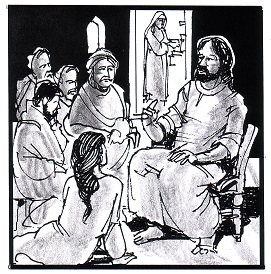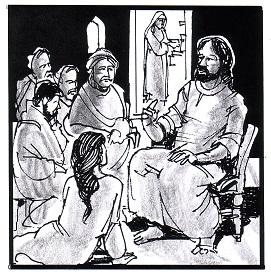

“The one thing necessary” (Luke 10:42).
Jon 3:1-10; Luke 10:38-42
The story of the two sisters, Martha and Mary, has a parallel in the story of the Prodigal Son. The fact that Martha welcomes Jesus indicates that she is the older sister. While she takes up the duties of hospitality and preparing the meal, her younger sister, Mary, excuses herself from assisting to sit at the feet of Jesus listening. Martha’s frustration is like that of the older brother who sees his younger brother abandon all responsibility yet still get the father’s attention. In both stories, Jesus goal is to reconcile the siblings and bring them together in the total love being offered to all.
But both stories typically also stir up sympathy for the older, more responsible brother and sister, who seem to be treated unfairly. Jesus antticipated this feeling of hurt and even resentment because he was trying to convince righteous people to show the same mercy for apparent sinners that God shows them. Unconditional love is the hardest lesson of all, but it is the very essence of God, who is love. Other stories like the unjust steward or the vineyard workers contain the same challenge and invoke the same complaint from good people: “It’s just not fair!”
Mary chooses the “better part” in focusing her full attention on Jesus, whose words are life itself, the free-flowing graciousness of God. She drops everything else to concentrate directly and intimately on his presence in the home. Martha’s heartfelt service, as important as it is, takes her away from offering the most important hospitality of all – to listen to another and thereby receive them personally and directly. More than practical things like setting the table, cooking the stew and cutting the bread is the opportunity to be fully present to this extraordinary guest for the brief time he is with them. This gift is offered to both sisters, but only Mary seems to understand it fully.
A bonus to this story is the evidence of Jesus' openness by welcoming Mary into the traditiionally all-male discussion of the scriptures while the women ordinarily did domestic chores and served the men. Mary shares in the explication of the Word with Jesus and other disciples, a hint at the radical role the women will later play by being the first to understand the meaning of Jesus' death and resurrection.
Revised from 2013
Advertisement






